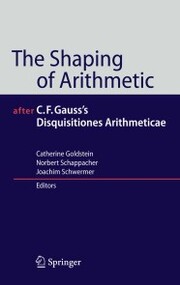Detailansicht
The Shaping of Arithmetic after C.F. Gauss's Disquisitiones Arithmeticae
eBook
ISBN/EAN: 9783540347200
Umbreit-Nr.: 1680633
Sprache:
Englisch
Umfang: 578 S., 5.64 MB
Format in cm:
Einband:
Keine Angabe
Erschienen am 03.02.2007
Auflage: 1/2007
E-Book
Format: PDF
DRM: Digitales Wasserzeichen
- Zusatztext
- <P>Since its publication, C.F. Gauss's Disquisitiones Arithmeticae (1801) has acquired an almost mythical reputation, standing as an ideal of exposition in notation, problems and methods; as a model of organisation and theory building; and as a source of mathematical inspiration. Eighteen authors - mathematicians, historians, philosophers - have collaborated in this volume to assess the impact of the Disquisitiones, in the two centuries since its publication.</P>
- Autorenportrait
- <p><b>Catherine Goldstein</b> is Directrice de recherches du CNRS and works at the Institut de mathématiques de Jussieu (Paris, France). She is the author of "Un théorème de Fermat et ses lecteurs" (1995) and a coeditor of "Mathematical Europe: History, Myth, Identity"(1996). Her research aims at developing a social history of mathematical practices and results, combining close readings and a network analysis of texts. Her current projects include the study of mathematical sciences through World War I and of experimentation in XVII th-century number theory.</p><p><b>Norbert Schappacher</b> is professor of mathematics at Université Louis Pasteur, Strasbourg.His mathematical interests relate to the arithmetic of elliptic curves.But his current research projects lie in the history of mathematics. Specifically, he focuses on the intertwinement of philosophical and political categories with major junctures in the development of mathematical disciplines in the XIX\up{th} and XX\up{th} centuries. Examples include number theory and algebraic geometry, but also medical statistics.</p><p><b>Joachim Schwermer</b> is professor of mathematics at University of Vienna. In addition, he serves as scientific director at the Erwin-Schroedinger International Institute for Mathematical Physics, Vienna. His research interests lie in number theory and algebra, in particular, in questions arising in arithmetic algebraic geometry and the theory of automorphic forms. He takes a keen interest in the mathematical sciences in the XIX\up{th} and XX\up{th} centuries in their historical context.</p>
